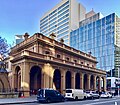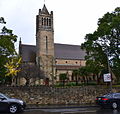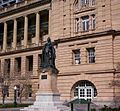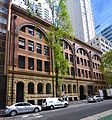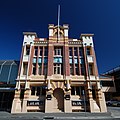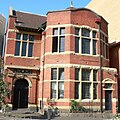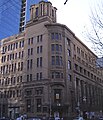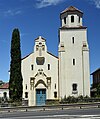Loading AI tools
Australian non-residential architectural styles are a set of Australian architectural styles that apply to buildings used for purposes other than residence and have been around only since the first colonial government buildings of early European settlement of Australia in 1788.
This article needs additional citations for verification. (September 2020) |
Their distribution follows closely the establishment and growth of the different colonies of Australia, in that the earliest colonial buildings can be found in New South Wales and Tasmania.
The classifications set out below are derived from a leading Australian text.[1]
- Old Colonial Georgian; Old Colonial Regency; Old Colonial Grecian; Old Colonial Gothic Picturesque
Old Colonial Georgian
- St Luke's Anglican Church, Liverpool. Completed 1820; designed by Francis Greenway.
- Old Liverpool Hospital (main block). Completed 1822; designed by Francis Greenway.
- St Peter's Anglican Church, Campbelltown; completed 1823.[8]
- The Old Windmill, Brisbane; completed 1824; Brisbane's oldest building
- Greenway Wing (Supreme Court of New South Wales) Sydney; completed 1828; designed by Francis Greenway
Old Colonial Regency
- Parliament House, Sydney, Completed 1816
- Sydney Mint, Completed 1816
- Sydney Grammar School, Completed 1835. Northern and southern extensions completed in the 1850s
- Old King's School, Parramatta. Completed 1833
- Lord Nelson Hotel, Millers Point, Sydney, Completed 1835.[10]
- Hero of Waterloo Hotel, Millers Point, completed 1844
- Orient Hotel, The Rocks, Completed 1844.
- St James Old Cathedral. King Street, Melbourne, 1839–1849, resited 1914. One of Melbourne's oldest surviving buildings.[11]
Early Colonial Classical
- Darlinghurst Courthouse, Taylor Square. Completed 1844.[12]
- St George's Anglican Church, Battery Point; completed 1836; steeple and portico from 1841.[10]
Early Colonial Gothic Picturesque
- St John's Cathedral, Parramatta. Completed in 1802, towers added in 1819
- The former government stables, now the Sydney Conservatorium of Music; completed in 1821.[14]
- St Patrick's Church, The Rocks; completed 1840.[15]
- St James' Anglican Church, Morpeth; completed in 1840
- Adelaide Gaol, Northern Parklands, Adelaide. Completed 1841.[16]
- Garrison Church, Sydney; completed in 1846
- St Peter's Church, Eastern Hill Melbourne; completed in 1846
The Victorian period, generally aligned with the reign of Queen Victoria, covers the period from c. 1840 to c. 1890 and comprises fifteen styles, all prefaced by the word "Victorian", and are namely, in loose chronological order, Georgian, Regency, Egyptian, Academic Classical, Free Classical, Filigree, Mannerist, Second Empire, Italianate, Romanesque, Byzantine, Academic Gothic, Free Gothic, Tudor, Rustic Gothic, and Carpenter Gothic.
Victorian Georgian
An extension and continuation of the Old Colonial Georgian style into the Victorian era.[17] Georgian style houses built before c.1840 are characterised as Old Colonial Georgian, while buildings between c.1840 and c.1890 are characterised as Victorian Georgian. Both styles are essentially the same, being characterised by symmetrical facades, simple rectangular and prismatic shapes, and orderliness. Six and eight paned windows were common.[17]
- Albury Court House, Albury; built 1860; Palladian-style
- Campbell's Stores, The Rocks; built 1850–1861
- Fremantle Prison, Fremantle; built 1850–57.
Victorian Regency
As with Victorian Georgian architecture, the Victorian Regency style was a continuation of the Old Colonial Regency style into the Victorian era (c.1840 – c.1890).[18] A more elegant and refined form of the Georgian style.
- Old Government House, Brisbane; completed 1862
- Edmund Blacket Building, Prince of Wales Hospital, Sydney
- Rockpool, The Rocks
- 103 George Street, The Rocks
Victorian Egyptian
- Hobart Synagogue, Tasmania (1845).[19]
- Commonwealth Bank building, Murwillumbah
- Launceston Synagogue (1846).[19]
- Masonic Centre, Adelaide. (1858)
- Obelisk, Sydney, detail
Victorian Academic Classical
- Art Gallery of New South Wales; completed in 1897
- Australian Museum, Sydney; completed in 1857
- Treasury Building, Sydney. Completed 1851
- Geelong Town Hall. Designed 1855; completed 1917.[20]
- State Library of Victoria, Swanston Street, Melbourne; completed 1856
- Parliament House, Melbourne; completed 1856.[21]
- Former Baptist Church House, East Melbourne; completed 1863
- Melbourne Trades Hall; completed 1875
- Old State Library Building, Brisbane; completed 1879
- South Melbourne Town Hall, South Melbourne. Completed 1880.[20]
- Customs House, Sydney; completed in 1887
- Parliament House, Adelaide; completed in 1889
- St Kilda Town Hall; completed 1890
- Carrington House; Bathurst. Completed 1890
- Sydney Pharmacy School, Camperdown.
Victorian Free Classical
- General Post Office, Sydney; built between 1866-91 and 1910 in the Free Classical and Italian Renaissance styles[24][25][26]
- Orange Post Office. Completed 1879
- Albury Post Office, Albury. Completed 1880
- Bathurst Courthouse, Bathurst. Completed 1880
- Grahame's Corner, Sydney. Completed 1882
- Gardiner House, Sydney. 1885
- Goulburn Court House; built between 1885-87 and demonstrating Palladian concepts and Mannerist influences[28]
- St Georges Hall, Newtown. Completed 1887
- North Sydney Post Office; completed 1889[31]
- Fitzroy Town Hall, Melbourne; completed in 1890[32]
- Paddington Town Hall, Sydney; built between 1890-91[33]
- Pinnacle House, Sydney. Completed 1892
- Royal Naval House, Sydney. Completed 1890s
- Hong Kong House, Sydney central business district[35]
Victorian Filigree
- Reid's Coffee Palace, Ballarat; completed 1886
- Regatta Hotel, Brisbane, present building constructed in 1886. Richard Gailey, architect.
- Chief Mechanical Engineer's office, Eveleigh; built 1887.
- London Chartered Bank of Australia Building, Bourke. Completed 1888.
- Goodman's Buildings, Annandale, constructed in stages between 1890-1912.
Victorian Mannerist
Notable examples in Australia include: Culwulla Chambers (Sydney); Old Police Station, The Rocks Block Arcade (Melbourne); Stalbridge Chambers (Melbourne), National Bank Pall Mall (Bendigo); RESI Chambers (Melbourne); Lygon Buildings, Medley Hall (Carlton, Victoria); Former Money Order Post Office and Savings Bank (Melbourne); Mutual Store (Melbourne);
- Former Mutual Store, Flinders Street, Melbourne; completed 1891
- Stalbridge Chambers, Little Collins Street, Melbourne; completed 1891
- Benvenuta, Carlton, Victoria; completed 1893
- Former Prahran Arcade, Prahran, Melbourne; completed 1889
- Lygon Buildings, Lygon Street, Melbourne; completed 1888
- Strand Arcade, Sydney; Completed in 1892
- Culwulla Chambers, Sydney; completed in 1912
- The Sydney Club, Sydney. Completed 1887
- 73 York Street, Sydney (right hand side). Completed 1890s
- Agincourt Hotel; Chippendale. Completed 1898
- Cooma courthouse; Cooma
Victorian Second Empire
Notable examples include: Sydney Town Hall (Sydney); Hotel Windsor (Melbourne); Princess Theatre (Melbourne); Former Records Office (Melbourne); Melbourne General Post Office (Melbourne); Melbourne Town Hall (Melbourne); East Melbourne Synagogue (East Melbourne, Victoria); Royal Exhibition Building (Carlton, Victoria); Collingwood Town Hall (Collingwood, Victoria); South Melbourne Town Hall (South Melbourne, Victoria); Malvern Town Hall (Malvern, Victoria); Former Rechabite Hall (Prahran, Victoria); Brunswick Town Hall (Brunswick, Victoria); Camberwell Town Hall (Camberwell, Victoria); Bendigo Town Hall (Bendigo, Victoria); Shamrock Hotel (Bendigo Victoria); Bendigo Courthouse (Bendigo, Victoria); Bendigo Post Office (Bendigo, Victoria); Institute of Technology (Bendigo, Victoria); Queensland Parliament House (Brisbane)
- Parliament House, Brisbane; completed 1868
- Kew Asylum, Kew; completed 1871
- East Melbourne Synagogue. East Melbourne; completed 1877
- Royal Exhibition Building, Melbourne; completed 1880
- Hotel Windsor, Melbourne; completed 1883
- Princess Theatre, Melbourne; completed 1886
- General Post Office; completed 1887
- Former Rechabite Hall, Prahran completed 1888
- Malvern Town Hall, Malvern; completed 1890
- Bendigo Town Hall, Bendigo; completed 1885
- Bendigo Post Office, Bendigo; completed 1892
- Bendigo Court House, Bendigo; completed 1892
- Shamrock Hotel, Bendigo; completed 1897
- Grand Hotel, Healesville
- Chief Secretary's Building, Sydney. Completed 1886. Also displays Victorian Free Classical architectural traits
- Sydney Town Hall. Completed 1889
- Dubbo Post Office, Dubbo
- Waterloo Town Hall, Waterloo, New South Wales, with Victorian Italianate and Victorian Second Empire architectural elements. Completed 1881
- Bathurst District Hospital, Bathurst. Completed 1886
- Tenterfield Post Office, Tenterfield with Victorian Second Empire and Victorian Italianate architectural elements. Completed 1880s
Victorian Italianate
- Albury railway station, Albury; built 1881
- Institute Building, Darlington
- Leichhardt Town Hall, Leichhardt; completed in 1888
- Balmain Court House, Balmain. Completed 1888
- Maitland Post Office, Maitland. Completed in 1881
- Goulburn Post Office, Goulburn. Completed 1881
- Kings Hotel, Sydney. Completed 1879
- Former National House (now Hotel CBD), York Street, Sydney
- Redfern Post Office, Sydney. Completed 1882.[41]
- Forbes Post Office, Forbes. Completed 1881
- Royal Hotel, Queenscliff
- Grand Hotel, Yarra Glen
Victorian Romanesque
- St Michael's Uniting Church, Melbourne; completed 1866
- Burns Philp Building, Sydney; completed 1901
- St Saviours Anglican Church, Redfern
- St Johns Church in Glebe; completed 1870
- St Andrew's Presbyterian Church, Manly; completed in 1890[42]
Victorian Renaissance Revival
- Former Bank of NSW building, now KFC fast food restaurant, located at 107-109 Bathurst Street, Sydney, constructed between 1894 and 1895.[44]
- Newcastle Customs House, completed 1899
Victorian Byzantine
- Jubilee Building, Perth; opened 1899
- Holy Trinitity Orthodox Church; Surry Hills. Completed 1890s
Victorian Academic Gothic
- St Peter's Cathedral, Adelaide; completed 1901
- St Andrew's Cathedral, Sydney. Completed 1868
- University of Sydney (main quadrangle); completed 1855
- Anderson Stuart Building (University of Sydney); completed 1883
- Old Pathology Building Melbourne University; completed 1885
- St Peter's Cathedral, Armidale. Completed 1875
- St John's College, Sydney
Victorian Free Gothic
- Former Metropolitan Gas Company Buildings; Flinders Street, Melbourne; completed 1892; Venetian Gothic applied to a tall building
- Ormond College, Melbourne University; completed 1881
- Former Stock Exchange, Collins Street, Melbourne; completed 1888.[45]
- Former Safe Deposit Building, Collins Street, Melbourne; completed 1890
- ANZ Bank, 390 Collins Street, Melbourne; completed 1883
- Old Rialto Building, Collins Street, Melbourne; completed 1888.[45]
- Olderfleet Buildings, Collins Street, Melbourne; completed 1888.[45]
- St George's Presbyterian Church, St Kilda East, Victoria; completed 1880.[45]
- Victoria Brewery, East Melbourne, Victoria; completed 1882
- St Vincent's College, Potts Point. Completed 1886
- St Patrick's Seminary, Manly; completed 1885
- Hunter Baillie Memorial Presbyterian Church, Annandale. Completed 1889
- St Paul's Presbyterian Church; Armidale Completed 1882
- Nightingale Wing, Sydney Hospital. Completed 1869
- Royal Prince Alfred Hospital, Camperdown. Completed 1892
Victorian Tudor (Jacobethan)
- Government House, Sydney with Gothic Picturesque elements. Completed 1845
- Old Arts Building, University of Melbourne; completed 1857
- Main Quadrangle, University of Sydney; completed 1862
- Government House, Perth; completed in 1864
- Barracks Arch, Perth; completed in 1863
- HM Prison Pentridge, Coburg, Victoria; completed in 1864
- Old Registry Wing (Supreme Court of New South Wales), Sydney. Completed 1862
- North Terrace, University of Adelaide
Victorian Rustic Gothic
- St Mark's Rectory, Darling Point
- Ryde Public School; Ryde
- Manly Congregational Church, Manly
- Former North Sydney Technical High School, North Sydney
Victorian Carpenter Gothic
- Christ the King Church, Graceville
- Blayney Uniting Church; Blayney.
- St John's Lutheran Church, Minyip
- Sandgate Baptist Church
Edwardian architecture is generally less ornate than high or late Victorian architecture,[47] apart from a subset - used for major buildings - known as Edwardian Baroque architecture.
Edwardian Baroque
Notable examples include the Lands Administration Building in Brisbane, the Queen Victoria Hospital, Melbourne (main pavilion, now Queen Victoria Women's Centre), the Commonwealth Offices, Treasury Place, Melbourne, the Department of Education building in Sydney (1912)[48] and the General Post Office, Hobart.
- Department of Education building, Sydney.
- Land Administration Building, Brisbane. Completed 1905
- Queen Victoria Hospital, Melbourne. Completed 1916
- General Post Office, Hobart. Completed 1905
12 styles, each style name prefaced by "Federation":
- Academic Classical, Free Classical, Filigree, Anglo-Dutch, Romanesque, Gothic, Carpenter Gothic, Warehouse, Queen Anne, Free Style, Arts and Crafts, Bungalow
Federation Academic Classical
- Mitchell Librarian, State Library of New South Wales, completed 1910
- Newcastle Post Office, completed 1903
Federation Free Classical
Notable examples include: Sydney Hospital (Sydney), Taronga Zoo Pavilion (Sydney), the main terminus building of the Central railway station in Sydney,[49] Flinders Street station (Melbourne), Sacred Heart Church (St Kilda, Victoria), Read's Emporium (Prahran, Victoria), Old Royal Hotel (Williamstown, Victoria), the former Queensland Lands Administration Building (Brisbane).
- Flinders Street station, Melbourne, completed 1910
- Former Read's Emporium, Prahran, completed 1914
- Old Royal Hotel, Williamstown, with arts and crafts influences
- Sacred Heart Church, St Kilda, completed 1891
- Former Lands Administration Building, Brisbane, completed 1905
- Sydney Hospital, completed 1894
- Queen Victoria Hospital, Melbourne completed 1912
- Perth Institute of Contemporary Arts Building, completed 1896
- Central railway station, Sydney. Completed 1906
- Former Parcels Post Office, Railway Square, Sydney. Completed 1913
- Marcus Clarke Building (TAFE), Railway Square, Sydney. Completed 1910-1924
- Taronga Zoo. Completed 1916
- Thomas Walker Convalescent Hospital Buildings, Concord. Completed 1893
- Dimmey's Building, Richmond, Victoria. Built c. 1910.
- Odeon Theatre, Hobart. Completed 1916, pictured in 1929
Federation Second Empire
- Former Records Office. Queen Street, Melbourne. Completed 1900.
- Town Hall Administration Buildings. Swanston Street, Melbourne. Completed 1908.
Federation Filigree
- Exchange Hotel, Kalgoorlie. Completed 1900.[53]
- Imperial Hotel, Ravenswood; with prominent fretwork verandah; built 1901.[54]
- P&O Hotel, Fremantle. Completed 1901
- Buchanan's Hotel, Townsville. Built 1902, demolished 1984. Three-tiered filigree in cast iron, wrought iron, timber and glass.[51]
- Kurri Kurri Hotel, Kurri Kurri; built c. 1904.
- Freemasons Hotel (Toodyay); two-storey verandah added c. 1905.
- Shopfront, Stanmore; built c. 1907.
- Shamrock Hotel, Rochester; built c.1912.
- Criterion Hotel, Warwick; built 1917.[51]
Federation Anglo-Dutch
- The ASN Co building, Sydney a very early and rare pre-Federation version of the style; completed in 1885
- City of Melbourne buildings, Elizabeth Street, Melbourne, a very early example of the style; completed in 1888
- University of Melbourne main buildings, Carlton; completed in 1888
- Prahran Market, Prahran; completed in 1891, early Anglo-Dutch
- St Nicholas Hospital buildings, Carlton
- Eastern Hill Fire Station, East Melbourne; completed in 1893
- Winfield Building, Collins Street, Melbourne, also demonstrates Queen Anne traits; completed in 1891
- Perseverance Hotel, Fitzroy
- Crown Hotel, Sydney. Completed 1909
- Santa Sabina College, Strathfield. Completed 1894[63]
- Railway Institute Building, Surry Hills. Completed 1890s[64]
- Chamberlain Hotel, Sydney. Completed 1904
- York Hotel, Kalgoorlie. Completed 1901
Federation Romanesque
- Sydney Technical College (Former Sydney Technical High School building). Completed 1891
- Old Museum Building, Brisbane; completed in 1891.[66]
- Victorian Artists Society, East Melbourne. Built 1892.[20]
- Bairnsdale Court House, Bairnsdale; completed in 1893.[66]
- Queen Victoria Building, Sydney; completed in 1898.[66]
- Perth Mint, Perth, completed in 1899
- Fremantle Markets, Fremantle; completed in 1902
- Shelbourne Hotel, Sydney. Completed 1902
- 354 George Street, Sydney, Completed 1904
- Hackett Hall, Perth; completed 1908, now part of the Western Australian Museum
- St Mary's Roman Catholic Church, Bairnsdale; completed in 1913
- Former Melbourne Magistrates' Court. Completed 1914.[20]
Federation Gothic
- Camperdown Memorial Clock Tower in Camperdown; completed in 1897
- Sacred Heart Cathedral in Bendigo; completed in 1896
- RMIT Building 4, Swanston Street, Melbourne; completed in 1904
- Registrar-General's building, in Sydney; completed in 1913
- MacLaurin Hall, University of Sydney. Completed 1902-1909
- Saints Mary and Joseph Cathedral; Armidale, New South Wales. Completed 1912
- A.C Goode House in Collins Street, Melbourne; completed in 1891
Federation Carpenter Gothic
- Coonamble Anglican Church
- St Mary's Church, Townsville
- The Uniting Church, Penguin, Tasmania. Completed 1903
Federation Warehouse
- The Big Store, Prahran, completed 1902.
Federation Queen Anne
- The Austral Buildings, Collins Street, Melbourne; completed in 1891
- Professional Chambers, Collins Street, Melbourne; completed in 1908
- The Sydney Corn Exchange, a rare remaining warehouse; built from 1887 and designed by George McRae[69]
- Grace Brothers Department Store, Broadway, Sydney. Completed 1923
- St Augustine's Church, Balmain, New South Wales. Completed 1905
Federation Free Style
- Townsville Customs House. Completed 1902; architect, George David Payne.[70]
- City Baths, Melbourne; completed 1904. Design by J J Clark & E J Clark.
- Fire station, Pyrmont. Completed 1906; architect, Walter Liberty Vernon.
- Fremantle Post Office. Completed 1907; architect, Hilson Beasley. Alternating bands of red brick and pale stucco dominate the facade.[70]
- Observer Hotel, The Rocks. Completed 1908; architects, Halligan & Wilton.
- St Marys Catholic Church, Erskineville. Built c. 1912; architect, J. McCarthy. An uninhibited reinterpretation of the Gothic style.
- Chamber of Commerce Building, The Rocks. Completed 1912; architect, Walter Liberty Vernon.
- Prahran Mechanics' Institute, Prahran. Built c. 1915.
- Palisade Hotel, Millers Point. Completed 1916; architect, H. D. Walsh.[73]
- The Examiner building, Launceston.[70]
Federation Arts and Crafts
- Glen Innes Post and Telegraph Office. Completed 1896; architect, Walter Liberty Vernon.
- Fire station, Leichhardt. Completed 1906; architect, E.L Drew.
- Former Post & Telegraph Offices, Windsor
- Former State Savings Bank, Ararat.
Federation Bungalow
16 styles, each style name prefaced by "Inter-War":
- Georgian Revival, Academic Classical, Free Classical, Beaux-Arts, Stripped Classical, Commercial Palazzo, Mediterranean, Spanish Mission, Chicagoesque, Functionalist & Modern, Art-Deco, Skyscraper Gothic, Romanesque, Interwar Gothic, Old English, California Bungalow
Inter-war Georgian Revival
- Albert Hall, Canberra, opened 1928
- Elizabeth Murdoch Building, Victorian College of the Arts, Melbourne
- Queanbeyan City Council Chambers, Queanbeyan. Completed 1927; architect, J. W. Sproule.[76]
Inter-war Academic Classical
- Brisbane City Hall; opened in 1930
- Shrine of Remembrance, Brisbane; completed in 1930
- Shrine of Remembrance, Melbourne; completed in 1934
Inter-war Free Classical
- CML Building, Geelong; completed in 1923
- Former Sydney Morning Herald building, Pitt Street, Sydney. Completed 1920s
- Public Trust Office, Sydney. Completed 1926
- Richmond Town Hall, Melbourne. Remodeled 1934-36; architect, Harry R. Johnson.[76]
Inter-war Beaux Arts
- Former Melbourne Mail Exchange, Bourke Street, Melbourne; completed in 1917
- Former Port Authority Building, Market Street, Melbourne
- National Theatre. St Kilda; completed 1929
- Herald and Weekly Times Building, Flinders Street, Melbourne
- Argus Building. LaTrobe Street, Melbourne; completed 1927. Features large giant order columns with Egyptian decorative motifs
- General Post Office, Perth; completed 1923
- Commonwealth Bank building, Forrest Place, Perth; completed 1933
- Commonwealth Bank building, Martin Place, Sydney. Completed 1928
- Perpetual Trustee building, Sydney. Completed 1917
- Beaux Arts Style office block, Sydney
- Banking House, Sydney. Completed 1912
- Beaux Arts style commercial building in Broadway, Sydney
Inter-war Stripped Classical
- Old Parliament House, Canberra, designed by John Smith Murdoch; opened 1927
- Wyvern House, Newington College; opened 1938
- AMP building in Albury
- Petersham Town Hall; designed in 1938
- Rockdale Town Hall; designed in 1940
Inter-war Commercial Palazzo
- Westpac Bank building. 33 Queen Street, Brisbane; completed 1920
- London Stores. Elizabeth Street, Melbourne; completed 1922
- Myer Melbourne main store, Lonsdale Street, Melbourne; completed 1933
- Dymocks Building, George Street, Sydney
- Commercial Banking Company, George Street, Sydney. Completed 1920s
- Trust Building; Sydney. Completed 1916
- Gowings Building, Sydney. Completed 1929
- Commonwealth Trading Bank building, Sydney. Completed 1916
- Temple Court Building, Melbourne
- Nicholas Building. Swanston Street, Melbourne; completed 1925
- Former AMP Building. Collins Street, Melbourne; completed 1927
Inter-war Mediterranean
- Sydney and Melbourne buildings, City Centre, Australian Capital Territory; commenced building 1920s
- St Kilda Sea Baths. St Kilda
- Markets, West End
Inter-War Spanish Mission
- Our Lady of Victories Church, Bowen Hills. Built 1924-25; architects likely to be Thomas Ramsay Hall and George Gray Prentice.[77][78]
- Holy Trinity Anglican Church, Woolloongabba. Completed 1930; architect, Eric Ford.[80]
- Roxy Theatre, Parramatta. Completed 1930; architects L. F. Herbert and E. D. Wilson.[80]
- Royal Hotel, Tenterfield. 1935 remodel by J P Donoghue, architect.[86]
- Mechanics Institute Hall, Mendooran. Completed 1935. Designed by Walter Innes-Kerr.
Inter-war Art Deco
- Australian War Memorial; building completed 1941; Byzantine architecture style with strong styling elements of art deco throughout
- Elmslea Chambers, Goulburn; built 1933; it was one of the first buildings in Australia to use Glazed architectural terra-cotta in its façade
- Forgan Smith Buildings and Great Court, University of Queensland; completed 1927
- Anzac War Memorial, Sydney; completed 1934.
- Art Deco office building. Lonsdale Street, Melbourne. Obvious influences of North American skyscraper planning
- Alkira House, Queen Street, Melbourne. One of the most striking Glazed architectural terra-cotta and glass brick clad Art Deco buildings in Australia
- Gledden Building, Perth; completed in 1935. The Gledden Building was the only large commercial building in the Art Deco style ever built in Western Australia
- AWA Tower, Sydney
- Museum of Contemporary Art, Sydney. Completed 1940s
- APA Building Martin Place, Sydney
- State Theatre, Sydney. Competed 1929
- City Mutual Life Assurance Building, Sydney. Completed 1936
- Henry Davis York Building, Sydney.
- Railway House, York Street, Sydney
- Toilet Block, Belmore.
- Challis House, Martin Place, Sydney. Completed 1938
- David Jones Building, Elizabeth Street, Sydney
- T&G Geelong, 1934
Skyscraper Gothic
- Victoria Hotel on Little Collins Street, Melbourne
- Former Sun building
- Former Sun building, Elizabeth Street, Sydney
- Manchester Unity Building, Collins Street, Melbourne
Inter-war Chicagoesque
- Capitol Theatre, Swanston Street, Melbourne; opened in 1924
- Former Masonic Club, Flinders Street, Melbourne
- Love and Lewis building. Prahran; completed in 1928
- WD and HO Wills Building, Perth, Western Australia; completed 1927
- Dovers Building, by Hugh Ralston Crawford; completed 1908
- Ballarat House, Wentworth Avenue, Surry Hills; 1915[87]
- Former Cleveland Shoe Company Factory, Victoria Street, Erskineville; 1923[88]
- Former Wrigley's Factory, Crewe Place, Rosebery; 1919[89]
Inter-war Functionalist & Moderne
- Lonsdale House, Lonsdale Street, Melbourne; architect IG Anderson; completed 1937; demolished 2010
- Presgrave Building, Little Collins Street, Melbourne; completed 1938
- Former Victoria carpark, Little Collins Street, Melbourne; completed 1939; Melbourne's oldest multi-storey carpark in the streamline moderne style
- Hastings Deering, Crown Street, Woolloomooloo; Architects Lipson & Kaad; completed 1938; refurbished 2013
- Mitchell House, a 1937 Streamline Moderne style building built in 1937 Melbourne
Interwar Gothic
- Montsalvat artists colony (Great Hall), Eltham; re-uses architectural elements from demolished Collins Street buildings; completed 1938
- St George's College, Perth; opened 1931 and partially modelled after Selwyn College, Cambridge.
Inter-war Old English (20th Century Tudorbethan)
- Shopfront in Toorak, Victoria
- A mock Tudor row on Commercial Road, South Yarra
- Old English style shops, Lindfield.
- Old English shops, Elsternwick, Melbourne.
Inter-War Functionalist & Moderne
The functionalist and moderne style often used combinations of blonde and brown bricks in linear vertical or horizontal patterns. Notable examples include: Museum of Contemporary Art (Sydney); Captain's Flat Hotel (NSW); Russell Street Police Headquarters (Melbourne); Astor Theatre (St Kilda, Victoria); Ballarat Law Courts (Ballarat);
- Hotel at Captains Flat built 1938; Functionalist
- Heidelberg Town Hall, Heidelberg, Victoria; built 1937; a fine example of interwar brick moderne
- the Astor Theatre, St Kilda; built 1937
- Law Courts, Ballarat
- Former Police Headquarters, Russell Street, Melbourne; built 1940; an example of interwar brick moderne heavily influenced by North American skyscrapers
5 styles, each style name prefaced by "Post-War":
- Ecclesiastical, International, Modern
Ecclesiastical
- Cathedral of the Holy Cross, Geraldton. Completed 1964. Unorthodox star shaped plan.
- St Boniface Anglican Cathedral, Bunbury. Completed 1962. Traditional cruciform plan.
- St Marys Anglican Church, South Perth built 1957
International Style
- Adelaide High School, West Terrace, Adelaide. Completed 1951.[92]
- Agnes Walsh Nurses Home, King Edward Memorial Hospital for Women, Subiaco, Western Australia; circa 1952.[92]
- Lennon's Hotel, Broadbeach. Built 1957.[92]
- Qantas House, Sydney. Designed by Rudder, Littlemore & Rudder; built from 1955-1957.
- Orica House, East Melbourne; Completed 1958. Early curtain wall glass building and tallest in Australia when completed.[93]
- AMP Building, Sydney; Built 1958-1952. Designed by Peddle, Thorp and Walker architects.
- Pinjarra Police Station, Pinjarra, completed 1962.
Modern
14 styles, each style name prefaced by "Late Twentieth Century":
- Stripped Classical, Ecclesiastical, International, Organic, Brutalist, Structuralist, Late Modern, Post Modern, Immigrants' Nostalgic
Stripped Classical
- National Library of Australia, Canberra; completed 1964.[94]
- Reid Library, University of Western Australia; from 1964.[94]
- Dallas Brooks Hall, East Melbourne; completed 1969.
International
- Australia Square, Sydney. Completed 1967. Australia's first true modern skyscraper.
- Optus Centre, Melbourne. Completed 1975.
- 25 Martin Place, Sydney. Completed 1977.
- Edmund Barton Building, Canberra. Completed 1974
Organic
- Parliament House, Canberra. A mixture of Organic and contemporary stripped classical elements. Completed 1988.
Brutalist
Notable examples include: Sydney Masonic Centre/Civic Tower (Sydney); Suncorp Place (Sydney); Sydney Law School (Sydney); Cameron Offices (Canberra); High Court of Australia (Canberra); State Library of Queensland (Brisbane); Queensland Performing Arts Centre (Brisbane); Law Courts (Brisbane); Suncorp Plaza (Brisbane); National Gallery of Victoria (Melbourne); Total carpark (Melbourne); WTC Wharf; Harold Holt Memorial Swimming Centre (Malvern, Victoria); St Kilda Public Library (St Kilda, Victoria); Plumbing Trades Employees Union of Australia Building (Melbourne); University of Melbourne Faculty of Engineering (Melbourne); Metropolitan Fire Brigade (East Melbourne, Victoria); R.A.W. Woodgate Centre (Kew, Victoria); Olivetti Building (Sydney); UTS Tower (University of Technology, Sydney); St Anthony's Church (Marsfield, Sydney). See Category:Brutalist architecture in Australia.
- National Gallery of Victoria, St Kilda Road, Melbourne, completed 1962
- 10 Murray Street, Hobart, completed 1969
- Perth Concert Hall, completed 1973
- Public Transport Centre, Perth, completed 1976
- Law Courts, Brisbane, completed 1976-77
- High Court of Australia, Canberra, completed in 1980
- Suncorp Place, Sydney, completed 1982
- Henty House, Launceston, completed 1983.[96]
- Queensland Performing Arts Complex, South Brisbane, completed 1985
Structuralist
- Sydney Opera House is often difficult to classify. Completed 1973.
- The Australian Academy of Science building, named the "Shine Dome", Canberra, designed by Roy Grounds, completed 1959
- Sidney Myer Music Bowl. Melbourne. Completed 1959. One of the earliest examples of a tensile structure
- Lexus Centre (former Olympic Pool). Melbourne. Completed 1956.
- Brisbane Convention & Exhibition Centre. Completed 1995. Complex load bearing hyperbolic paraboloid roof design, a precursor to 21st Century structuralism.
Late Modern
- 200 Queen Street. Melbourne. Completed in 1983. Curved mirror glass skyscraper.
- Rialto Towers, Melbourne; completed 1986. Australia's best example of a mirror glass corporate skyscraper
- Waterfront Place, Brisbane. Completed 1989.
- Governor Phillip Tower, Sydney. Completed 1994.
- QV.1, Perth. Completed in 1991.
- Deutsche Bank Place, Sydney. Completed in 2005, a more recent example of the late modern style
Post Modern
A subset of postmodernism is mock-historicism tries to imitate historic styles using modern materials to the point where it is difficult to tell them apart from historic buildings. The most imitated styles are those that are easiest to clone (including the Georgian style).
- Paddy's Markets redevelopment (completed 1976). Haymarket. Tower is reflective of the building style
- The Jam Factory redevelopment (completed 1979). Chapel Street, South Yarra. Completed in 1979. Feature mock historical elements juxtaposted with old factory
- Former Australian Stock Exchange (completed 1990). Collins Street, Melbourne. Features a classical inspired podium base and Georgian inspired pyramid roof.
- 120 Collins Street (completed 1991). Collins Street, Melbourne. Evocative of an interwarNorth American skyscraper.
- Chifley Tower (completed 1992). Sydney. Inspired by interwar North American skyscraper
- Hotel Grand Chancellor (completed 1993). Launceston, Tasmania. Mock historic composition of Georgian and Second Empire styles.
- RMIT Building 8 (completed 1993). Swanston Street, Melbourne. Uses novel decorative elements and references to pop-culture.
- Boundary Street retail buildings (completed 1999). West End, Queensland. A cartoonish take on Victorian Mannerism.
- Westin Hotel (completed 2000). Collins Street, Melbourne. Evocative of the Second Empire.
- Apartments (completed 2001).Port Melbourne, Victoria evocative of the Second Empire.
- Aurora Place, Sydney. Completed 2000
- HSBC Building, George Street, Sydney. Completed 1987
Deconstructivist
Notable examples include Green Building RMIT; Deakin University main building; Australian Centre for Contemporary Art; Gottlieb House (Melbourne)
- Storey Hall (The Green Building). RMIT. Swanston Street, Melbourne. Completed 1994. One of the earliest examples of Deconstructivist design in Australia.
- 450 Swan Street. Completed 1995. Deconstructivist form integrates an old bank with new offices.
Immigrant's Nostalgic
- St Spyridon Greek Orthodox Church, Kingsford, New South Wales. Completed in 1975
- Auburn Gallipoli Mosque, Auburn, New South Wales. Completed in 1999
Several new and continued 20th-century styles, all prefaced with "21st-century" - Deconstructivist, Post modern, Structuralist, Sustainable, Modern
Deconstructivist
Notable examples include Federation Square; Shrine of Remembrance crypt; Sofo House (Melbourne) Swan Bells (Perth)
- Swan Bells. Perth. Completed in 2000.
- Federation Square. Melbourne. Completed 2002.
- Australian Centre for Contemporary Art. Southbank. Completed 2002
Post Modern
- National Museum of Australia. Completed 2001.
- Port 1010 building at the Digital Harbour precinct, Melbourne Docklands. Completed 2008.
- Perth Arena. Completed 2012.
Structuralist
Advanced structuralism facilitated by Computer Aided Design
- Docklands Stadium. Melbourne; completed 2000.
- Southern Cross station, Melbourne; completed 2006.
- Carousel Pavilion, Geelong; completed 2006.
- Stadium Australia, Sydney Olympic Park. Completed 1999
- Olympic Park railway station, Sydney. Competed 1998
Sustainable
Notable examples in Australia include: 60L (Melbourne); CH2 (Melbourne); K2 Apartments (Windsor, Victoria); Dunc Gray Velodrome (Sydney); Forest EcoCentre (Tasmania); Rozak House (Noonamah, Northern Territory).
- K2 Apartments. Windsor, Victoria. Completed 2006. Highly visible solar panels, prominent natural ventilators and use of natural materials.
- Council House 2. Little Collins Street, Melbourne. Completed 2006. World's first 6 star green rating building features louvered facade, natural and recycled materials, solar panels and thermal mass cooling.
Green building
Modern
- Brisbane Square. Brisbane; completed 2006.
- Queensland Gallery of Modern Art. Brisbane; completed 2008.
- Brookfield Place, Perth, completed 2012.
- 200 George Street, Sydney, 2016
- World Square, Sydney. 2005
- International Convention Centre Sydney. Completed 2017
Wikiwand in your browser!
Seamless Wikipedia browsing. On steroids.
Every time you click a link to Wikipedia, Wiktionary or Wikiquote in your browser's search results, it will show the modern Wikiwand interface.
Wikiwand extension is a five stars, simple, with minimum permission required to keep your browsing private, safe and transparent.









